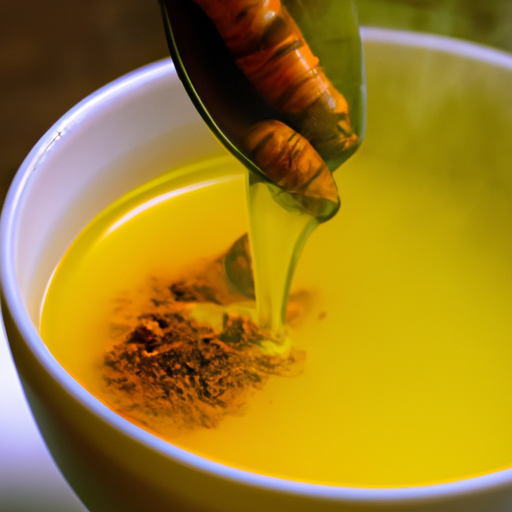I enjoy sipping on turmeric tea every morning. It’s a tasty and nutritious way to kick off my day.
Not only does it taste great, but it’s also packed with antioxidants and anti-inflammatory compounds that help boost my immune system and keep me feeling energized throughout the day.
In this article, I’ll share with you how to make turmeric tea using real turmeric root so that you can experience all of its amazing health benefits too.
Before we get started, let’s talk about why turmeric tea is so good for you. Turmeric contains a powerful compound called curcumin, which has been shown to have numerous health benefits such as reducing inflammation, improving brain function, and lowering the risk of chronic diseases like heart disease and cancer.
By incorporating turmeric into your daily routine through drinking turmeric tea, you can reap these benefits in an easy and delicious way.
So let’s get started on making our own homemade turmeric tea!
Key Takeaways
- Choose bright orange-yellow, heavy roots of turmeric and slice them thinly before drying.
- Store dried slices in an airtight container for up to two weeks.
- Steep dried turmeric slices in hot water for 5-10 minutes and add natural sweeteners or spices like honey, lemon, ginger, cinnamon, or cardamom for flavor.
- Turmeric tea has numerous health benefits including reducing inflammation, boosting immunity, aiding digestion, and protecting against harmful pathogens and free radicals, but it may have potential side effects and interact with certain medications.
Health Benefits of Turmeric Tea
Turmeric tea is renowned for its numerous health benefits, including reducing inflammation and improving brain function. As a natural remedy, turmeric tea has been used for centuries to treat a variety of ailments, such as arthritis and digestive issues. The active ingredient in turmeric, curcumin, is known to have powerful anti-inflammatory properties that can help alleviate pain and swelling.
Incorporating turmeric tea into your daily routine can also improve cognitive function. Studies have shown that curcumin may increase the production of brain-derived neurotrophic factor (BDNF), which is responsible for promoting the growth of new neurons in the brain. This can lead to improved memory and overall cognitive performance.
So why not try incorporating turmeric tea into your daily routine? But first, let’s talk about choosing the best turmeric root.
Choosing the Best Turmeric Root
To ensure a warm, comforting cup of tea that’ll provide the health benefits you crave, you’ll want to take your time selecting the perfect root for your recipe.
When choosing the best turmeric root, there are several factors to consider. First and foremost, you want to make sure you’re getting your turmeric from a reputable source to ensure its purity and quality. Look for sources that use organic farming practices and are transparent about their production methods.
Another important quality indicator is the color of the root. The brighter orange-yellow it is, the better. Avoid roots that appear dull or have blemishes as they may not be as fresh or potent.
Lastly, select roots that feel heavy for their size as this indicates they have a higher moisture content and will be easier to grate or slice for tea preparation.
With these tips in mind, you can confidently choose the best sources of turmeric root for your homemade tea recipe.
Now that you’ve selected your perfect turmeric root, it’s time to prepare it for brewing!
Preparing Your Turmeric Root
Get ready to bring out the flavors of your freshly chosen root by slicing it into thin pieces and placing them on a baking sheet. Before doing so, make sure that you have washed and dried the turmeric root thoroughly. You can use a vegetable peeler or a small knife to remove the skin from the turmeric root. There are several peeling techniques that you can use, but it is important to be careful not to waste any of the precious flesh.
Once you have peeled your turmeric root, slice it into thin pieces using a sharp knife or mandoline slicer. Spread these slices out onto a baking sheet covered with parchment paper and let them dry for at least 24 hours in a cool, dry place. You can also store your sliced turmeric root in an airtight container for up to two weeks in the refrigerator before brewing your tea. With properly prepared turmeric roots, you’ll be able to enjoy all the health benefits and delicious flavors in every cup of tea!
Brewing Your Tea
Are you ready to brew a cup of delicious and healthy turmeric tea? First, select a teapot that suits your taste and needs. Ceramic or glass teapots are recommended because they retain heat well and don’t affect the taste of the tea.
Then, steep your dried turmeric slices in hot water for 5-10 minutes. The longer you steep, the stronger the flavor will be. After steeping, strain out the turmeric slices and add honey or lemon for extra flavor if desired. You can also add other spices like cinnamon or ginger to enhance the taste and health benefits of your turmeric tea.
Now, it’s time to savor this warm and comforting beverage that’s loaded with antioxidants and anti-inflammatory compounds! In the next section, we’ll explore some creative ways to prepare turmeric tea recipes that suit different preferences and occasions.
Turmeric Tea Recipes
Indulge in a cup of warm, aromatic turmeric tea that’s not only flavorful but also beneficial for your health with these creative recipes. Turmeric tea benefits are numerous, as this golden spice contains powerful anti-inflammatory and antioxidant properties.
To make a simple yet delicious turmeric tea, all you need is fresh turmeric root or powder, water, honey (optional), and black pepper. For a basic recipe, grate one teaspoon of fresh turmeric root or use half a teaspoon of turmeric powder and add it to two cups of boiling water. Let it simmer for 10 minutes before straining the liquid into a mug. You can sweeten it with honey if desired and sprinkle some black pepper on top to enhance its absorption.
For added flavor and extra health benefits, you can also experiment with other ingredients such as ginger, cinnamon, cardamom, or lemon juice. Turmeric tea for inflammation has been shown to be effective in reducing pain and swelling caused by various conditions such as arthritis or sports injuries.
Transitioning into the subsequent section about storing and reusing your turmeric root, remember that there are many ways to enjoy the goodness of this versatile spice beyond just making tea. In the next section, we’ll explore how you can store your leftover turmeric root properly and reuse it in different recipes for maximum flavor and nutrition.
Storing and Reusing Your Turmeric Root
To properly store and reuse your leftover turmeric root, you’ll want to keep it in a cool, dry place such as a pantry or spice cabinet. Avoid storing it in the refrigerator as the moisture can cause mold growth.
It’s also important to store it away from other strong-smelling spices, as turmeric is known for its strong flavor and aroma.
When it comes to reusing your leftover turmeric root, there are plenty of ideas to try. You can grate some fresh turmeric into soups or stews for added flavor and health benefits.
You can also use it in smoothies or juices for an extra boost of antioxidants. In our next section, we’ll explore different variations of turmeric tea that you can make using your stored and reused turmeric root.
Turmeric Tea Variations
I love exploring different ways to enjoy turmeric tea, and there are a few variations that I always come back to.
First up is iced turmeric tea, which is perfect for hot summer days. Simply brew your tea as usual, add some ice cubes, and maybe a slice of lemon or lime for some extra flavor.
Another delicious twist on traditional turmeric tea is the turmeric latte. This creamy and cozy beverage combines the health benefits of turmeric with the comforting taste of warm milk. To make it, simply mix brewed turmeric tea with steamed milk (dairy or non-dairy) and a touch of sweetener like honey or maple syrup.
Lastly, let’s not forget about chai lovers! Turmeric chai tea is another great way to spice up your regular cuppa. Brew your favorite black tea along with some spices like cinnamon, cardamom, ginger, and of course – turmeric! Add some milk and sweetener to taste for a warming and flavorful treat.
Iced Turmeric Tea
Cool off with a refreshing glass of iced turmeric tea made with real turmeric and a hint of honey. It not only tastes delicious but also provides numerous health benefits.
Here are three reasons why you should give iced turmeric tea a try:
-
Anti-inflammatory properties: Turmeric contains curcumin, which has anti-inflammatory effects on the body. Drinking iced turmeric tea can help reduce inflammation and alleviate symptoms associated with conditions such as arthritis and other inflammatory disorders.
-
Boosts immunity: Turmeric is rich in antioxidants that help boost the immune system, protecting the body from harmful pathogens and free radicals.
-
Refreshing summer drink: Iced turmeric tea is a perfect way to cool off during hot summer days while reaping its health benefits.
Now that you know the benefits of iced turmeric tea, let’s move on to another delicious variation – the turmeric tea latte!
Turmeric Tea Latte
Get ready to indulge in a creamy and cozy treat with the turmeric tea latte – perfect for those chilly fall evenings! This latte combines the health benefits of turmeric tea with the comforting warmth of milk.
Turmeric has been used for centuries in Ayurvedic medicine to aid digestion, reduce inflammation, and boost immunity. By incorporating it into your daily routine through this delicious latte recipe, you can reap these benefits while enjoying a tasty beverage.
To make a turmeric tea latte, start by brewing a cup of strong turmeric tea using fresh or powdered turmeric. Next, heat up your choice of milk (dairy or non-dairy) on the stove until hot but not boiling. Add honey or maple syrup for sweetness if desired.
Pour the hot milk over the brewed tea and stir well. Top with cinnamon or nutmeg for an extra cozy touch.
If you’re looking to switch up your turmeric tea game even further, try experimenting with different recipe ideas such as adding ginger or black pepper for enhanced absorption of curcumin (the active ingredient in turmeric), blending it into smoothies or using it as a base for soups and stews. But before we move onto that, let’s first explore another popular version of this beloved drink – turmeric chai tea!
Turmeric Chai Tea
You’re in for a treat with this spiced and aromatic drink – the turmeric chai tea is like a warm hug on a cold day, with its rich flavors of cinnamon, cardamom, cloves, and ginger that will transport you to an exotic land of sensory delight. But did you know that using turmeric in other beverages can also provide health benefits? Adding turmeric to your diet has been shown to have anti-inflammatory properties and may even aid in digestion.
Here’s how to make your own turmeric chai tea at home:
| Ingredients | Amount |
|---|---|
| Water | 2 cups |
| Black tea bags | 2 |
| Cinnamon stick | 1 |
| Cardamom pods | 4-5 |
| Cloves | 3-4 |
| Ginger root (peeled and grated) | 1 tablespoon |
| Turmeric powder or fresh grated turmeric root* | 1 teaspoon |
First, bring the water to a boil in a saucepan. Add the black tea bags and let steep for about five minutes. Then add the cinnamon stick, cardamom pods, cloves, ginger root, and turmeric powder or freshly grated turmeric root. Let simmer for another five minutes before straining into mugs. Enjoy!
As you sip on your delicious homemade turmeric chai tea, keep in mind some tips for enhancing the flavor in our next section about ‘tips for enhancing the flavor’.
Tips for Enhancing the Flavor
To truly elevate the taste of your turmeric tea, try adding a dash of black pepper or a squeeze of fresh lemon juice for added depth and complexity. These two simple additions can make a world of difference in the flavor profile of your tea.
Another way to enhance the taste is by experimenting with different spice combinations and sweeteners. Some popular options include cinnamon, ginger, honey, and maple syrup. When considering spice combinations, keep in mind that certain spices may overpower the flavor of the turmeric. It’s best to start with small amounts and adjust as needed.
As for sweeteners, natural options such as honey or maple syrup can complement the earthy taste of turmeric without overwhelming it with sweetness. With a little experimentation, you’ll find the perfect combination to suit your taste buds.
While these tips can greatly enhance the flavor of your turmeric tea, it’s important to be mindful of potential side effects such as stomach upset or allergic reactions.
Potential Side Effects
Now that we’ve discussed some tips for enhancing the flavor of turmeric tea, it’s important to also be aware of potential side effects and precautions.
While turmeric is generally considered safe when consumed in moderate amounts as a spice or seasoning, consuming large amounts or taking high doses of turmeric supplements may lead to certain side effects.
Some common side effects include stomach discomfort, nausea, dizziness, and diarrhea.
Additionally, turmeric may interact with certain medications such as blood thinners and anti-inflammatory drugs, so it’s important to consult with a healthcare provider before adding turmeric to your diet if you are taking any medications.
Pregnant women should also use caution when consuming large amounts of turmeric as it may stimulate the uterus and potentially lead to complications during pregnancy.
Overall, while there are many potential health benefits associated with consuming turmeric, it’s important to take necessary precautions and monitor your intake to avoid any negative side effects.
Frequently Asked Questions
Can turmeric tea help with weight loss?
Turmeric tea recipe is a metabolism booster that can aid weight loss. It’s packed with antioxidants and anti-inflammatory properties, making it a healthy addition to your diet. Try it for yourself and feel the benefits!
How long does it take to see the health benefits of turmeric tea?
It can take a few weeks to notice the health benefits of turmeric tea. The dosage and frequency of drinking the tea plays a role in how quickly one will see results. Turmeric tea benefits include reducing inflammation, improving brain function, and aiding digestion.
Is it safe to consume turmeric tea daily?
Can I drink turmeric tea every day? Benefits include reducing inflammation and improving brain function. However, too much can cause side effects such as nausea and diarrhea. Consult a healthcare professional before daily consumption.
Can turmeric tea help with reducing inflammation?
Turmeric tea benefits include reducing inflammation, thanks to its active ingredient curcumin. Variations of turmeric tea recipe exist, including adding black pepper to increase absorption. It’s important to consult a healthcare provider before consuming daily.
Can turmeric tea be used as a natural remedy for headaches?
Did you know that headaches affect over 45 million Americans each year? Turmeric tea recipes can be used as a natural remedy for headaches, with some studies suggesting it may be as effective as other remedies.
Conclusion
Well, that’s it! Making turmeric tea with real turmeric is a simple and easy process. It not only offers numerous health benefits, but it also has a delicious taste and aroma.
With just a few steps, you can brew your own cup of warm and comforting turmeric tea. Remember to choose the best quality turmeric root available, wash and peel it properly, and adjust the recipe according to your preferences.
Whether you like your tea sweet or spicy, there are plenty of variations to try out. So why not give it a go today? Your body will thank you for all the goodness packed into this small but mighty root! This tea’s so good, it’ll knock your socks off!










